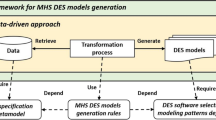Abstract
This paper presents an approach for simulation experiments at early stages of the shipbuilding process. In the early stages of the planning process, the design of the ship is not yet complete. However, an early scheduling of the production is already needed for staff employment and material ordering. Because the plan is based on incomplete input data, the uncertainty in production planning is much higher than in serial production with fully detailed product design and routings. The uncertainty reduces the accuracy of planning and, therefore, has a significant impact on its quality and robustness. The paper presents an approach to describe this uncertainty and to reduce it by generating design details from historical data.






Similar content being viewed by others
References
Gruß R (2010). Schlanke Unikatfertigung—Zweistufiges Taktphasenmodell zur Steigerung der Prozesseffizienz in der Unikatfertigung auf Basis der Lean Production. Gabler Verlag: Wiesbaden.
Hinrichs H (2002). Datenqualitätsmanagement in Data Warehouse-Systemen. PhD thesis, Universität Oldenburg.
Kandel A (1991). Fuzzy Expert Systems. CRC press: Boca Raton.
Kuhlmann T (1994). Konzeption und Entwicklung eines Systems zur Koordinierung der Produktion komplexer Unikate. PhD thesis, Universität Bremen.
Li Z, Ierapetritou M (2008). Process scheduling under uncertainty - Review and challenges. Computers & Chemical Engineering 32(4–5): 715–727.
Manzini M, Urgo M (2015). Makespan estimation of a production process affected by uncertainty: Application on MTO production of NC machine tools. Journal of Manufacturing Systems 37: 1–16.
Schmidt M (2011). Modellierung logistischer Prozesse der Montage. PhD thesis, Leibniz Universität Hannover.
Steinhauer D, Hübler M, Wagner L, Esins E, Pester P, Friedewald A and Wandt R (2011). GeneSim—Generisches Daten- und Modellmanagement für die schiffbauliche Produktionssimulation. In: Forschungszentrum Jülich (eds). Statustagung Schifffahrt und Meerestechnik: Rostock, pp 7–23.
Steinhauer D (2011). The Simulation Toolkit Shipbuilding—10 Years of Cooperative Development and Interbranch Applications. In: Proceedings of the 10 th International Conference on Computer and IT Applications in the Maritime Industries (COMPIT), Berlin, pp 453–465.
Storch R (1995). Ship Production. Cornell Maritime Press: Centerville, MA.
Tolio T, Urgo M, Váncza J (2011). Robust production control against propagation of disruptions. CIRP Annals - Manufacturing Technology 60(1): 489–492.
Wang R Y, Strong D M (1996). Beyond accuracy: What data quality means to data consumers. Journal of Management Information Systems 12(4): 5–33.
Werners B, Thorn J (2002). Supply Chain Planning bei Nachfrageunsicherheit. PPS Management 7(2): 51–54.
Statement of contribution
The early planning phase in the one-of-a-kind production is characterized by a lack of construction data and therefore a high uncertainty with regard to processing times. The following paper describes an approach on how to cope with this uncertainty by on the one hand describing and modeling it, and on the other hand creating more transparency in processing time estimation and reducing the uncertainty in the processing times.
The new approach for modeling the uncertainty is taking the data quality into consideration to determine the possible range of values. It is divided into three steps: to identify uncertain planning data, to quantify uncertain planning data and to model the impact of uncertain planning data on the target values.
The new approach for creating more transparency in the processing time estimation is splitting the estimation process by first estimating a bill of material and then linking the bill of material to process times. Therefore tracking estimation errors gets easier, as well as the estimation gets precise. The bill of material also enables the early use of simulation in shipbuilding, using the Simulation Toolkit Shipbuilding (STS).
Author information
Authors and Affiliations
Corresponding author
Rights and permissions
About this article
Cite this article
Steinhauer, D., Sikorra, J.N., Haux, M.A. et al. Processing incomplete data for simulation-based production planning in shipbuilding. J Simulation 11, 30–37 (2017). https://doi.org/10.1057/s41273-016-0048-3
Received:
Accepted:
Published:
Issue Date:
DOI: https://doi.org/10.1057/s41273-016-0048-3




